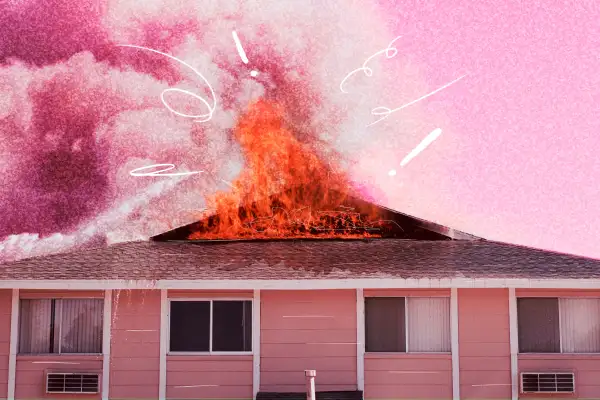More People Are Skipping Home Insurance to Save Money — and It Could Backfire

With homeowners insurance costs skyrocketing lately, more Americans are considering forgoing coverage to save money.
After double-digit increases last year, home insurance rates are expected to climb another 6% this year, according to Insurify, a comparison-shopping platform. Experts say the effects of climate change — compounded with the typical inflationary pressures of late — are largely to blame.
The latest data from the Insurance Information Institute (III), an industry trade group, shows 88% of homeowners are covered, but that figure has fallen from upwards of 95% just a few years ago. The dip can mostly be attributed to homeowners skipping home insurance coverage due to rapid price increases. In some cases, though, insurers are pulling out of high-risk areas, leaving residents in a scramble to find replacement coverage.
By the year's end, Insurify estimates the average annual insurance premium will exceed $2,500, though residents of states susceptible to tornadoes, hurricanes and wildfires should brace for rates much higher than that. In hurricane-prone Florida, for example, annual rates are expected to climb above $11,700 — by far the highest in the nation. A "highly active" Atlantic hurricane season threatens to push premiums higher still.
People flocking to disaster-prone areas are also causing insurance prices to rise, notes Loretta Worters, a vice president at III. She says this trend, which predates the pandemic, isn't likely to go away anytime soon and expects rates to continue climbing.
But that’s no excuse to skirt coverage altogether.
“Going bare” — industry jargon for eschewing homeowners insurance — “spells financial ruin for most homeowners,” says Worters, who spoke with Money in October 2023.
Is home insurance required?
Technically speaking, homeowners insurance isn’t legally required anywhere in the U.S.
However, the vast majority of homeowners have a mortgage. And almost all mortgage lenders require homebuyers to maintain home insurance coverage as part of the loan terms. Lenders require this coverage because they also have a vested interest in the property.
Some lenders bake the insurance premiums into the monthly mortgage payments, while others request annual proof of home insurance coverage.
On the other hand, if you don’t have a mortgage — because you either paid it off already or bought your home with cash — you’re under no obligation to keep your home covered, legally speaking.
“If your home is paid up, you can do what you want,” Worters says, though she strongly advises against going without home insurance.
What happens if you don’t have homeowners insurance
Skipping home insurance may sound like a way to save money, but experts say the consequences of doing so could wind up being far more costly.
Forced coverage
According to the Consumer Financial Protection Bureau, if your mortgage lender requires that you have homeowners insurance and you choose to ignore that, the mortgage company can take out a policy on the home and charge you for it anyway.
This process is called “force-placed” mortgage insurance, and it usually comes with a hefty price tag. “That coverage is more expensive than if you bought it through a regular home insurer,” Worters says.
What’s more, a force-placed policy only protects the lender — and not you if your home was destroyed or damaged. So be very wary of letting your policy lapse.
Facing disaster on your own
It may sound obvious, but if you forgo homeowners insurance and your home is damaged by a tornado, hurricane, wildfire or other disaster, you’re financially on your own.
Some folks who don’t have homeowners insurance are low-income earners who may be trying to cut expenses. But that strategy could prove counterintuitive.
“Weather does not discriminate by income,” III researchers wrote in a 2023 weather risk study. “Logic would suggest that only a small proportion of low-income homeowners could withstand the total loss of their home from an unforeseen weather event without insurance coverage.”
Costly bills and no coverage
Aside from most natural disasters, homeowners insurance typically covers personal property loss and injuries on your property, as well.
In reality, that means that if someone sued you for an injury they sustained in your front yard or a thief steals your expensive electronics, you may end up footing the bill if you don’t have homeowners insurance.
To underscore the importance of staying covered, Worters echoes Aesop’s fable of the ant and the grasshopper in which the grasshopper squanders its summer instead of getting ready for the cold.
“The moral of the story,” she says, “is ‘it's best to prepare for winter because winter always comes, and some winters may be worse than others.’"
More from Money:
Will New Rules for Real Estate Commissions Lower the Cost of Selling a Home?
Homeowners Are Increasing Insurance Deductibles to $5,000 or More to Save Money
How to Find Affordable Homeowners Insurance in a Tough Market

